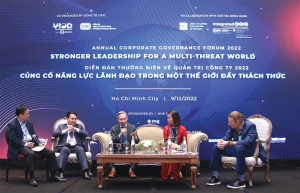Elevating the optimal capacity of corporate governance in Vietnam
Environmental, social, and governance (ESG) criteria was mentioned as an important action programme across all industries and all forms of ownership, including the private sector and foreign investment sector.
 |
| Ha Thu Thanh-President, Vietnam Institute of Directors; Chairperson, Deloitte Vietnam |
According to the evaluation results of the Top 10 Listed Companies 2022 released on December 2, the application of good corporate governance practices that go beyond legal requirements remains a challenge for the Vietnamese business community, and listed companies in particular.
This reflects the realisation that, despite various improvements in the last year, Vietnamese businesses still face many constraints when compared to other countries in the region. While businesses in many countries are already familiar with globally accepted principles of corporate governance, many Vietnamese enterprises are still not ready to implement them.
Corporate governance is more than just following the letter of the law. Beyond compliance, corporate governance is regarded as one of three critical components of sustainability, and a measure of business competitiveness. Corporate governance associated with the climate, carbon emission reduction, and social responsibility must be included in development strategies, which begins with the board’s transformation from awareness to action.
According to a Deloitte survey, 97 per cent of business leaders said their companies have already been impacted by climate change. Furthermore, businesses face pressure from various stakeholders, including the government, investors, customers, and employees.
Meanwhile, the number of climate change policies adopted globally has nearly 10-fold increased over the last three decades. Regulations to accelerate the transition to a low-emission economy are expected to be developed as businesses rush to comply and adapt.
As a result, standard-setters have moved quickly on numerous projects and initiatives. In March, the International Sustainability Standards Board issued two drafts: IFRS S1 General Requirements for Disclosure of Sustainability-related Financial Information, and IFRS S2 Climate-related Disclosures.
As for investor expectations, they now place greater emphasis on action plans and transparency of information regarding the effects of climate and ESG on financial reporting. More than 500 global investors, representing more than $47 trillion in assets under management, have signed the Climate Action 100+ initiative, requiring large businesses that emit greenhouse gases to act. When evaluating investments, 82 per cent of investment funds consider the ESG factor, up from 78 per cent in 2020.
At the same time, over 80 per cent of consumers expects CEOs of consumer product brands to take further strides in reducing carbon emissions and single-use plastics.
When it comes to the expectations of the employees, 78 per cent of executives in a 2020 Deloitte survey said their employees are very concerned about climate change. In another Deloitte survey, 45 per cent of millennials said they would change jobs if the company did not implement sustainable business practices. Knowing that Vietnam is one of the countries most heavily affected by climate change, combined with the country’s vow to reach net-zero carbon emissions by 2050, the timing is right for Vietnamese businesses to come up with strategies, policies, and actions that take into account the three ESG pillars.
The board of any company plays a particularly important role in the initial steps to integrate these pillars into the corporate strategy. Specifically, there are seven tactics directly related to the board itself: understanding the ESG management model; defining the board’s governance structure; integrating ESG into the strategic fabric; aligning risk and oversight; understanding the company’s ESG maturity; overseeing the adoption of the framework; and assure, disclose, and communicate.
As these considerations gain prominence, there is an increased focus by stakeholders on the integrity of a company’s ESG disclosures. Regarding this issue, currently in Vietnam, when there is no integrated and clear standard to centralise all reporting requirements, many companies may react and provide little information so as to not affect their reputation.
Limited information for the purposes of benchmarking and verification could make it difficult for investors to evaluate the operational efficiency, thus missing out on important information. Companies also find it challenging to determine metrics to monitor, leading to over-monitoring without a way to explore and extract insights.
Furthermore, companies need a disclosure strategy that integrates ESG performance into multiple avenues. The board and company as a whole need a disclosure strategy that effectively integrates criteria into a variety of channels. Board members should understand the framework management is using to communicate the sustainability story to specific stakeholders.
Climate change risk management combined with good corporate governance will have an impact on social issues. ESG is not only an inevitable global trend, but also a critical issue to address for Vietnamese enterprises. Indeed, this is a chance for businesses to grow faster and stronger.
 | Businesses can show the way with ESG compliance The importance of sustainability to the bottom line, particularly a stronger corporate governance foundation, has risen to the top of the agenda for businesses large and small. |
What the stars mean:
★ Poor ★ ★ Promising ★★★ Good ★★★★ Very good ★★★★★ Exceptional
Related Contents
Latest News
More News
- The next leap in Cloud AI (December 11, 2025 | 18:19)
- Vietnam’s telecom industry: the next stage of growth (December 11, 2025 | 18:18)
- Five tech predictions for 2026 and beyond: new era of AI (December 11, 2025 | 18:16)
- CONINCO announces new chairman and CEO (December 10, 2025 | 11:00)
- How AWS is powering the next-gen data era (December 09, 2025 | 13:14)
- Outlook in M&A solid for Singapore (December 08, 2025 | 10:31)
- Vietnamese firms are resetting their strategy for global markets (December 05, 2025 | 17:04)
- LPBank Securities accelerates AI and data innovation with AWS (December 05, 2025 | 09:00)
- Improving traceability capacity with Zebra Technologies (November 26, 2025 | 10:08)
- Ho Chi Minh City engages 500 CEOs in dialogue on building global megacity (November 25, 2025 | 16:00)

 Tag:
Tag:




















 Mobile Version
Mobile Version